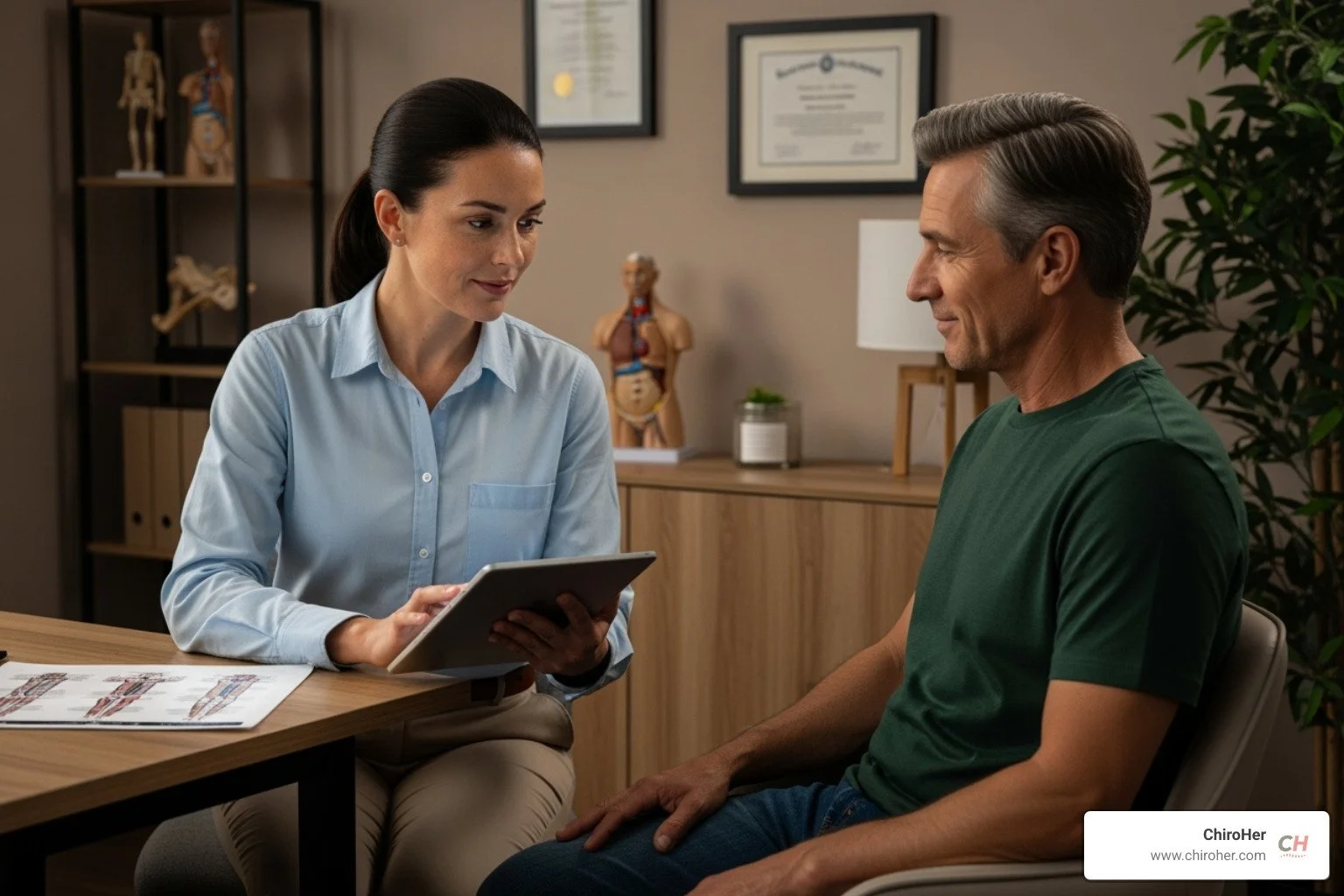The A-Z of Neck and Shoulder Pain: From Discomfort to Diagnosis
Why Understanding Neck and Shoulder Discomfort Matters
Neck and shoulder discomfort affects millions of people daily, yet many don't realize how interconnected these areas are. The pain you feel in your shoulder might actually start in your neck, and vice versa, because of shared nerve pathways and muscle connections.
Common causes range from poor posture and muscle strain to underlying conditions like pinched nerves or arthritis. Research shows that neck pain is common, affecting about 15% of adults in any three-month period, with high rates of recurrence. Understanding the root cause is the first step toward finding relief.
Hi! I'm Dr. Michelle Andrews, founder of ChiroHer in Oklahoma City, and I've helped hundreds of patients find relief from neck and shoulder discomfort through personalized, holistic care. My experience with prenatal patients, athletes, and busy professionals has shown me how these areas respond best to targeted, gentle treatment.
Solving the Causes of Neck and Shoulder Discomfort
Finding relief from neck and shoulder discomfort starts with understanding the real cause of your pain. Many treatments offer only temporary relief because they don't address the root issue. Your neck and shoulders work as a team, so a problem in one area often affects the other. Identifying your specific cause, whether it's posture, repetitive motion, or nerve compression, is the key to lasting relief. Let's look at the most common causes I see in my practice.
The Anatomy Connection: Why Neck and Shoulder Pain Overlap
Your neck and shoulders are anatomical neighbors. Your cervical spine, the seven vertebrae in your neck, supports your head while allowing for a wide range of motion. Nerve roots branch from your cervical spine, sending signals to your shoulders, arms, and hands. This is why a neck problem can cause symptoms like pain, numbness, or tingling down your arm. You can learn more about the anatomy of the cervical spine.
The shoulder joint is highly mobile and stabilized by the rotator cuff muscles. When these muscles are injured or overworked, they can strain neck muscles, creating a cycle of tension and discomfort. Because of this connection, a pinched nerve in your neck, known as cervical radiculopathy, can cause radiating pain or tingling in your arm. The location of these symptoms helps identify the affected nerve. More information is available on cervical radiculopathy explained.
Common Culprits: From Muscle Strain to Posture Problems
Most neck and shoulder discomfort I treat stems from our modern lifestyle, not serious medical conditions. Pain is your body's signal that something needs to change.
Tech neck results from craning your head forward to look at screens. This posture puts significant strain on your neck muscles, leading to muscle imbalances, chronic pain, and headaches. I've written a guide to Tech Neck Pain to help.
Poor sleeping positions are another frequent cause. Your pillow should support a neutral neck alignment. Stomach sleeping is especially hard on the neck. If you wake up sore, check my tips for Stiff Neck Pain in the Morning.
Stress and tension cause you to unconsciously tighten your neck and shoulder muscles. Over time, this can create painful trigger points. Addressing both physical and emotional stress is important for healing.
Muscle strain from overexertion, like lifting heavy objects awkwardly, can cause painful soft tissue injuries that require proper care to heal.
Repetitive motions from work or hobbies can create strain patterns that accumulate over time.
Common postural mistakes I see include slouching with rounded shoulders, forward head posture, cradling phones between the ear and shoulder, improper workstation setup, and carrying heavy bags on one shoulder. Each of these habits can create significant problems when repeated daily.
Underlying Medical Conditions Causing Neck and Shoulder Discomfort
While lifestyle is a major factor, some neck and shoulder discomfort is caused by underlying medical conditions that need professional diagnosis. These often develop slowly without a clear trigger.
Cervical spondylosis is age-related wear and tear of the neck, or arthritis. It involves disc degeneration and can create bone spurs. Many people have these changes without symptoms, and when pain occurs, it's usually manageable.
Herniated discs occur when a spinal disc's soft center pushes out and presses on a nerve. This can cause sharp, radiating pain, numbness, or weakness down the arm.
Osteoarthritis can affect neck and shoulder joints, causing morning stiffness that eases with movement. The inflammation can also irritate nerves.
Spinal stenosis is a narrowing of the spinal canal that puts pressure on nerves, causing pain, numbness, or weakness. It typically develops slowly. You can find more information about spinal stenosis.
Rotator cuff problems like tendinitis or tears are common with age. The pain can radiate to the neck, and guarding the injured shoulder often leads to secondary neck tension.
Frozen shoulder is when the shoulder capsule stiffens, severely limiting motion. The resulting muscle compensation frequently causes neck pain.
Navigating Your Path to Relief
Finding relief from neck and shoulder discomfort doesn't have to be overwhelming. The most effective approach combines home care with professional guidance when needed. Many people find significant improvement with the right strategies, though healing timelines vary for each person.
When to Seek Professional Help
Trust your instincts. Your body often signals when you need immediate attention. Seek emergency care for:
Sudden, severe neck pain without an obvious cause.
Symptoms like trouble walking, loss of coordination, or difficulty speaking, which could indicate a stroke.
Neck pain accompanied by fever, stiffness, and a severe headache.
Any loss of bladder or bowel control.
For less urgent issues, call a healthcare provider if:
Pain persists for more than a week or two despite home care.
You experience numbness, tingling, or weakness in your arms or hands.
Pain radiates down your arm or gets significantly worse with movement.
Seeking help early often leads to a faster recovery. There's no benefit to suffering through treatable pain.
At-Home Care and Prevention Strategies
Home care is your first line of defense against neck and shoulder discomfort, putting you in control of your own healing.
Ice and heat therapy: For new injuries, use an ice pack wrapped in a towel for 15 minutes to reduce inflammation. For chronic stiffness, apply heat with a heating pad or warm shower to relax muscles.
Gentle movement: Try simple neck stretches like side-to-side turns, ear-to-shoulder tilts, and chin tucks. Shoulder rolls also help release tension.
Ergonomic workspace: Adjust your workspace for better comfort. Position your monitor at eye level, keep your keyboard close, and use a headset for phone calls to avoid neck strain.
Sleep posture: Use a supportive pillow that maintains your neck's natural curve. Back sleepers generally need a flatter pillow, while side sleepers need a thicker one. Avoid stomach sleeping, as it forces your head into an unnatural position.
Movement breaks: Take a break every 30 minutes. Stand up, stretch, and do a few shoulder rolls to prevent stiffness from prolonged sitting.
Stress management: To prevent unconscious muscle tightening, practice stress-reducing activities like deep breathing, gentle yoga, or short walks.
Chiropractic Care and Professional Support
When home care isn't enough, professional support can make a significant difference. At ChiroHer, we combine treatments to improve your daily life.
Chiropractic care addresses mechanical issues driving discomfort. When spinal joints are restricted, it can cause muscle tension and nerve irritation. Gentle adjustments restore proper movement and relieve pressure on nerves. Our holistic approach also includes acupuncture to support your body's healing. Learn more about our Chiropractic Care.
Therapeutic exercises are specific to your needs. Unlike generic exercises, our programs are designed to strengthen weak muscles and stretch tight ones, creating better balance and preventing re-injury. Read about our approach to Therapeutic Exercises.
At ChiroHer, we combine clinical expertise with genuine care. We create personalized treatment plans for pregnancy-related pain, athletic injuries, or daily strain that fit your lifestyle and goals. If you're ready to explore personalized solutions, we'd love to help you get started. Schedule a consultation with us.
Building Trust: Reliable Resources and Expert Guidance
When you're dealing with neck and shoulder discomfort, having access to trustworthy information can make all the difference. At ChiroHer, we believe that informed patients are empowered patients, which is why we ground our care in evidence-based practices.
We want you to understand your body and feel confident in your healthcare choices. For a deeper medical perspective, the Cleveland Clinic offers detailed explanations of causes, diagnosis, and treatment for neck and shoulder pain.
While resources like these are helpful, every person's experience with neck and shoulder discomfort is unique. This is why personalized care is so important.
We proudly serve the Oklahoma City metro area, including Yukon, Edmond, Nichols Hills, Del City, Mustang, and Moore. Our boutique approach means we listen to your concerns and create a treatment plan that fits your needs. Whether you need relief from chronic pain or want to prevent future issues, we are here to guide you with professional expertise and genuine care.
This content is for informational purposes only and does not constitute medical advice. Always seek the advice of your physician or other qualified health provider with any questions you may have regarding a medical condition.



